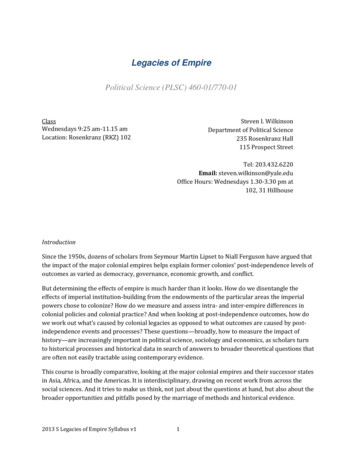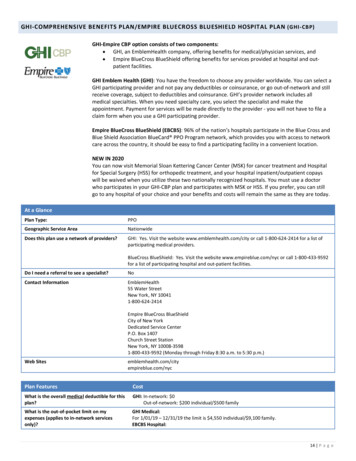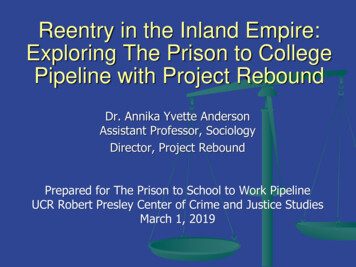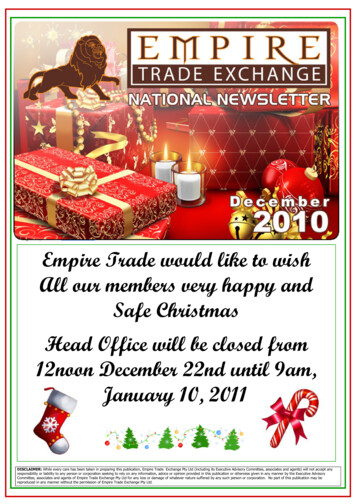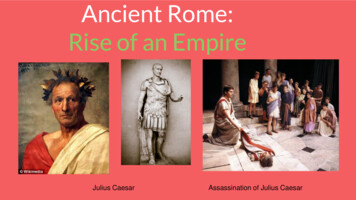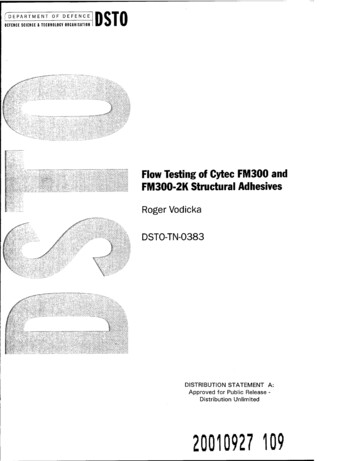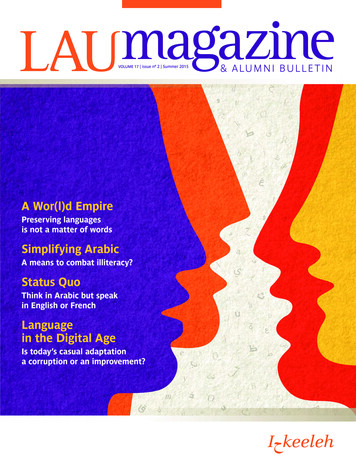
Transcription
& alumni bulletinVOLUME 17 issue nº 2 Summer 2015FEATURES6CONTENTSA Wor(l)d EmpireIt is expected that almost half of the world’sapproximately 7,000 idioms will disappear by theend of the century. As the magnitude of the die-offincreases in favor of dominant languages in a worldwhere connectivity is gaining the upper hand, FedericaMarsi ponders whether languages are something weshould endeavor to save.16Simplifying ArabicCould simplifying Arabic help combat illiteracy? ReemMaghribi discusses Arabic language, advancement andeducation with three LAU educators — professor ofliterature Latif Zeitouni, novelist and critic Elias Khouryand linguistics educator Rima Bahous.30Status QuoAn exploration of language acquisition and usagein post-civil war Lebanon reveals surprisinginterconnections between language, religion andsocioeconomic status. Irina Papkova also delves intoongoing debates within the academic community onthe relationship between language and personality andthe desirability of switching between linguistic codes.40Language in theDigital AgeA long list of digital media jargon like lolz, ridic andlotsa are among the 6,500 new entries the classicword game Scrabble has added to its dictionary.Brooke Anderson investigates whether this is thedirection that language is heading.4Empowerment through giving10Training translators to meet regionalresponsibilities11Do rankings matter?12SINARC forms everlasting bonds14Pharmacy program returns to roots of profession15Sidon acquires its own academy20Proceeds earmarked for women’s advancement21Women take center stage22Polished performances24LAU establishes a new legacy25A model university26A change for the better28Four years on29Fight food hygiene at home34Postcard from New York35Arab stereotypes dispelled36The art of the story38Phoenicians inspire new LAU Byblos library39Building a culture of organ donation44Campus notes47Road safety boosted48Alumni update52Read my body53Staying connected56Why I give backpage 1
Wherever You GoLAU Magazine & Alumni Bulletin is your platform to share photosand news about yourself, your family and your friends. Weencourage you to update us on your professional and personalactivities and achievements—from wherever you are!LAU’s gardeners reading the magazine during their breakHelp Tell Our HistoryWe welcome news from alumni, friends, supporters and current and formerfaculty and staff members representing all of the university’s current andformer schools and colleges. Submit your stories and photos for inclusion inLAU’s online and print publications.Submit to: marcom@lau.edu.lb, orMarketing and Communications DepartmentLebanese American UniversityP.O. Box 13-5053/F24Chouran, Beirut 1102-2801LebanonNew York Headquartersand Academic CenterLebanese American University211 East 46th St.New York, NY 10017, USAPresidentJoseph G. JabbraEditorial Advisory BoardMarla Rice-Evans, VP, University AdvancementPeggy Hanna, AVP, MarComNassib Nasr, AVP, Development, MENA & EuropeAmal Abdel Massih, Exec. Director, Advancement ServicesAbdallah Al Khal, Exec. Director, Alumni RelationsEdward Shiner, Director, Alumni & Special ProjectsManaging EditorLeena F. SaidiAssociate Editor BeirutLinda DahdahAssociate Editor New YorkPaige KollockCopy EditorIrina PapkovaWritersBrooke AndersonDana HalawiReem MaghribiFederica MarsiRaja RiachiAline SaraContributorsLana Abou TeenNicole BarghoutManwa GhanoumSana KouatlyGhada MajedNayla Abou Merhi MoujaesNada TorbeyEditorial AssistantsMaria Abou AtmiHaneen Bou AyyashDania HawatJessica KoueikNour RoumaniProduction ManagerZeina AbdallahGraphic DesignerMarianne Amkieh SibliniPhotographersBahaa GhoussainyJad JbaraMohamad KharboutlyYehia MallaAbdel Rahman SaddikPro StudioFront and back coverBy Palig HaroutunianLAU Magazine & Alumni Bulletin is publishedquarterly by the Marketing and CommunicationsDepartment (MarCom) at LAU and is distributedfree of charge to alumni, students, staff, faculty,friends and supporters worldwide.Comments can be sent to: marcom@lau.edu.lbpage 2Connect with LAU through:
From the President’s DeskDear Friends,In an era where globalization threatens cultural identity everywhere, there is a need to communicate our distinctiveness.It is through language that the traditions and shared values of a culture are conveyed and preserved. Language alsoplays a pivotal role in removing barriers between people to bridge cultures, an objective at the core of LAU’s mission. It isan essential resource that enables our students, scholars, faculty and researchers to explore the universe ever further.Through its B.A. in Arabic Language and Literature and its B.A. in English, LAU is able to trace how the vital role thatlanguage plays in the life of the individual has evolved over generations, both as an educational necessity and as ameans of social interaction. As well as being crucial for international mobility, language skills confer a considerablecompetitive edge in today’s job market.Language also makes us better at resolving cross-cultural conflicts. In learning another language, people inadvertentlylearn a new way of looking at the world. Conscious of this, LAU encourages multilingualism through its teaching of avariety of languages, including the little-spoken but much influential Latin.What of those wanting to learn more about our region? For Arabic language learners looking to not only improve theirlanguage skills but also to gain a true understanding of the cultural and social dynamics of the Middle East, our SummerInstitute for Intensive Arabic Language and Culture (SINARC) has for the past 16 years been and remains a top choice. TheSINARC program takes place both here in Lebanon and in the USA at our New York Headquarters and Academic Center.LAU mirrors the cultural and linguistic diversity that has become a prominent feature of today’s societies. Its annualLeaders for Democracy Fellowship program creates a network of young leaders from various cultures, who worktogether — through commonly spoken Arabic — to build a better future for themselves and their countries. In thesecircumstances, language no longer remains just a means of sharing one’s thoughts and ideas, but becomes a major tool ofintercultural communication.In this issue’s exploration of language acquisition and usage in post-civil war Lebanon surprising interconnectionsare revealed between language, religion and socioeconomic status. The issue also provides fodder for ongoing debateswithin the academic community on the relationship between language and personality and the desirability of switchingbetween linguistic codes. We also ask the question: In a world where connectivity is gaining the upper hand, should wecare if a language goes extinct?LAU not only keeps up with but also sets local and regional trends. The university’s M.A. in Women and Gender Studiesis just one such example. Each school at the university is essential in making up a patchwork fabric worthy of aninternational educational institution. Whether it’s through a conference on Syrian refugee policy, a panel discussionon Arab comic arts, an exhibition on stereotypes of Arabs in U.S. popular culture or the launching of a food safetycertification, LAU has much to offer.& alumni bulletinJoseph G. JabbraPresidentpage 3VOLUME 17 issue nº 2 Summer 2015Our dedication to the highest standards of education and civic engagement leads us to stride ever forward. Join us on ourjourney of discovery as we trace the important role that language plays in the life of our university and how this role hasevolved to benefit both LAU and its community at large.
School of BusinessEmpowermentthrough givingBy Dana HalawiThe Adnan Kassar School ofBusiness puts bright youngstudents on the path to successOn April 21 LAU received a generous gift of 10 million fromAdnan Kassar, chairman and major shareholder of FransabankGroup, for the purpose of naming the “Adnan Kassar School ofBusiness.” Kassar’s donation is one of the biggest philanthropicinvestments in the university’s history.“This is a wonderful story of a successful Lebanesebusinessman whose aim is to improve the quality of educationin his country,” says Said Ladki, dean of the Adnan Kassar Schoolof Business.“President Kassar is a pillar of this community and has alwaysrecruited our students. He strongly believes in the importance ofeducation and this is why he has committed his money towardthe betterment of LAU and Lebanon,” Ladki adds, pointingout that “naming the LAU School of Business after Kassar willproduce a positive impact in the community by encouragingmore Lebanese leaders to follow in his footsteps and supportbusiness education.”“ To become constructiveelements in society, educationand specialization areessential.”— Adnan Kassar, Lebanese businessmanand philanthropistpage 4
page 5& alumni bulletin— Fransabank and LAU — came together to achieve thesecommon goals,” he added.The Adnan Kassar School of Business is the biggest of LAU’sschools and attracts the highest number of students. It is alsoone of the oldest business schools in the Middle East andis an associate member of the most highly respected globalaccrediting body, Association to Advance Collegiate Schoolsof Business (AACSB), along with the European Foundation forManagement Development.The strong network of contacts within the school, itsreputation among regional employers and the widespread LAUalumni system make for a strong combination when it comesto graduates’ crucial search for employment. “There is a greatdemand for LAU business graduates due to the university’s higheducational standards and prestigious reputation,” says HassanChaker, who graduated from LAU in 2005 with a master’s degreein business studies.Chaker, who is also founder of recruitment and trainingcompany MCA, says that companies in Lebanon activelysearch out business graduates from LAU more than any otheruniversity. He highlights that his education at LAU boosted hisself-confidence and strengthened his interpersonal skills. “Evenin my business, I always advise my clients to hire people with apositive attitude and great interpersonal skills,” he explains.Likewise, Elissar Al Hajj, regional brand and communicationleader at Deloitte&Touche, says that her master’s degree inbusiness studies from LAU helped deepen her knowledgeabout banking. “It also helped me in acquiring a betterunderstanding of financial communication requirements,business planning, change management processes andmarketing research,” she adds.“I enrolled in the M.B.A. program at LAU although I had beenin the business for almost ten years, but I believe that lookingat academia from an executive eye is more refreshing as youpick and choose what you need to learn, and enhance thecompetencies and skills you want to improve,” she explains.Al Hajj says she was also fascinated by the ten-year planshared by Jabbra with stakeholders when he took the helm ofthe university. “I liked the visionary plan and where LAU washeading, and I wanted to be part of it,” she says.Ladki says that the business school is constantly renovatingand building itself, which makes it special and outstanding.“Every four years the school has a new strategic plan whichmatches well with the university’s plans,” he says.He adds that one of the most important short-term goalsfor the Adnan Kassar School of Business is its accreditationby the AACSB, which is expected to take place in spring 2016.“The school is well on its way to being accredited by theAACSB, which is the top premier accrediting body for schools ofbusiness around the world,” he says. “The school has achievedits first and second progress reports and it is in the process ofsubmitting its self-evaluation report.” Ladki describes the stepas being “an excellent milestone for the country and for LAU’sbusiness school.”According to Ladki, once the accreditation is awardedthe school will be offering two new undergraduate degrees:in business innovation and leadership and in operationmanagement. “We will also be offering a new master’s degree inhuman resources and another in finance,” he adds.VOLUME 17 issue nº 2 Summer 2015Kassar has held several prestigious positions throughouthis career both in Lebanon and the region. In 1972, he waselected president of the Beirut Chamber of Commerceand Industry. His success in getting the various LebaneseChambers of Commerce to cooperate productively led to theestablishment of the Federation of Chambers of Commerce,Industry and Agriculture, which he has chaired since itsfoundation.Today, Kassar is chairman of the General Union of ArabChambers of Commerce, Industry and Agriculture. Previously,he also served as chairman of the International Chamberof Commerce from 1999 to 2000. During his tenure heworked with the UN to create Global Compact, a frameworkthat encourages companies to adhere to socially andenvironmentally responsible business practices.Away from the world of business, Kassar has held keypolitical positions. From 2004 to 2005, he was Lebanon’sMinister of Economy and Trade and from 2009 to 2011 heserved as Minister of State.Kassar’s long and successful career has not, however,stopped him from engaging in philanthropic activities. Hehas contributed hundreds of thousands of dollars towarddifferent causes. He has also succeeded in highlightingFransabank’s leading role in promoting Corporate SocialResponsibility by supporting various sectors, mostimportantly education.“Education and specialization are essential for men andwomen to acquire knowledge that would lead them into lifeand make them constructive elements in society,” Kassarsaid in his speech during the signing ceremony held on theoccasion of the donation at LAU’s Beirut campus. “Thishas been the main reason behind my keenness to offerscholarships to bright young students, in this university andothers,” added Fransabank’s chairman.“President Kassar is an extraordinary human being.Alongside being a great defender of the private sector, heis an active participant in the advancement of society inLebanon and in the entire region,” said LAU President JosephG. Jabbra, adding, “today, two institutions steeped in history
A Wor(l)d EmpirePreserving languages is not just a matter of wordsF E AT U REBy Federica Marsipage 6
Every two weeks, a language goes silent forever. As the magnitude of the die-offincreases in favor of dominant languages, even Lebanon risks losing part of itscultural diversity. In a world where connectivity is gaining the upper hand, shouldwe care if a language goes extinct?Choosing your language reflects achoice of identityIn 1976, during the Soweto uprising inApartheid South Africa, around 20,000students took to the streets. 176 ofthem were killed while demonstratingagainst compulsory teaching in Afrikaans,the language of the colonizer. “Peoplechoose their language according to theidentity they want to endorse,” explainsBrian Prescott-Decie, senior instructor ofEnglish and Cultural Studies at LAU. Postcolonialism has, for this very reason, beencharacterized by attempts to reinstitutenative languages as an expression ofnational pride.Language shifts generally stem fromthe desire to enhance economic andsocial status, regardless of whether thismay antagonize pre-existing traditionsand cultures. Such a process does notoccur overnight. As a first step, a speakingcommunity acquires a bilingual fluency inanother language. Only later, the originallanguage is dropped in favor of the newlyacquired one.“ Languages like Englishand French are still thebest tools for effectivecommunication.”— Rima Bahous, LAU associate professorof Education and chair of theDepartment of EducationResearchers have also noted thatthe main factors pushing a communitytoward the abandonment of their originallanguage include discrimination andexclusion. Linguicism — or linguisticracism — manifests itself against peoplewhose mother tongue is different oragainst those who have an accent thatcan be traced back to a certain countryor geographical area. Not being able tospeak — or speak with the same accentor fluency — often results in peopleexperiencing prejudice and exclusion.Lebanon is no stranger to suchdynamics. The Domari language,spoken by Dom communities scatteredacross the country, has been officiallycategorized by UNESCO as one of theworld’s languages at risk of extinction.page 7& alumni bulletinInfographic by Alberto Lucas López for the South ChinaMorning Post that compares the number of peoplethat speak the top 23 languages in the world as theirprimary language.While the case for saving the Amurleopard or the giant panda may seemobvious, whether or not to battle forthe Dama or Luo languages is morecontroversial. On the one hand, theSapir-Worf hypothesis theorizes that thewords we use affect the way in whichwe conceptualize our surroundings.Consequently, the disappearance of alanguage is tantamount to the loss of aworld-view.In the Central African Republic, forinstance, Aka speakers have no wordfor ‘job,’ and yet differentiate betweenanimals that are eaten and those that arenot. In Tuva, a language spoken in Siberia,the past is always ahead while the futureis behind one’s back, according to theprinciple that, if the future were ahead, itcould easily be seen.On the other side of the coin, thenatural process of convergence towarda few dominant languages is enablingunprecedented connections and culturalexchanges. English in particular is ridingthe crest of technological innovation, aswell as consolidating its dominance infields ranging from science to air trafficcontrol.In order to save what is savable onthe road to globalization, linguistsare documenting idioms before theygo extinct. Lebanon is no stranger tolanguage endangerment and the variousprojects presently being conducted withthe mission of archiving dying languagesinclude efforts to safeguard the Lebanesedialect itself.VOLUME 17 issue nº 2 Summer 2015Hazel Sampson had a very strange fate.In February 2014, she died in Washingtonstate as the last speaker of Kallam,a language traditionally spoken onVancouver Island in British Columbia.Before her, many others had gone throughthe heartrending experience of having noone left to talk to.Historically, languages have alwayscome into being and later disappeared,some because of genocide, othersbecause of migration or educationpolicies, and still others for social orcultural reasons. Nowadays, economicdevelopment and globalization arepushing toward the global predominanceof languages like English, Spanish andMandarin at an unprecedented pace. It isexpected that almost half of the world’sapproximate 7,000 idioms will disappearby the end of the century, an extinctionrate even greater than the one beingexperienced by animal species.
F E AT U REAccording to UNESCO Atlas of Endangered Languages, at least43% of languages spoken in the world are endangeredFew elderly speakers are left to preserve Domari, alanguage that will soon be extinct in Lebanon“ Language is part of ourheritage and, by preservingone, you automaticallypreserve the other.”— Joseph Khoury, instructor, LebaneseLanguage Institute“Social exclusion and the prejudiceagainst the Dom community, improperlycalled ‘nawwar,’ is leading the youngergenerations into thinking that theirlanguage is useless and not worth saving,”says Bruno Herin, lecturer of Arabic at theFrench university INALCO.Thanks to a fund from the Hans RausingEndangered Languages Project, hosted bythe School of Oriental and African Studiesin London, Herin is documenting the lasttraces of a language that has travelled theworld to most probably die in Lebanon.“Lebanese people are not concerned aboutprotecting their own cultural diversityas they are not proud of communitiesassociated with poverty,” says Herin. “Theyare too busy looking westwards to careabout the Domari language.”Meanwhile in LebanonThe Lebanese language itself is beingexposed to the influence of dominantlanguages, particularly English and Fre
Postcard from new York arab stereotypes dispelled the art of the story . quarterly by the marketing and Communications Department (marCom) at lau and is distributed free of charge to alumni, students, staff, faculty, . company


